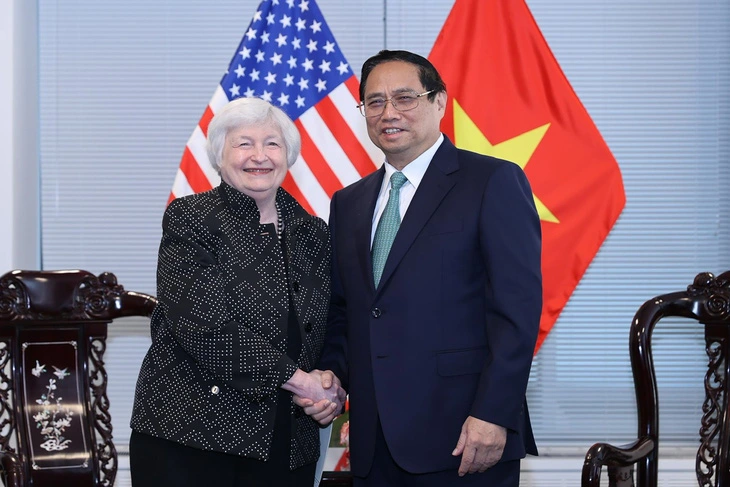US weighs upgrading Vietnam to ‘market economy’ status
Reuters reported that the hearing to decide whether Vietnam would be designated as a 'market economy' took place virtually on Wednesday afternoon (local time) in Washington, D.C.
Upon obtaining the market economy status, Vietnam will benefit from a reduction in punitive anti-dumping duties imposed on Vietnamese imports, a consequence of its current classification as a non-market economy with significant state influence.
At present, products originating from non-market economies face elevated tariff rates during anti-dumping duty investigations, wherein third-country proxy prices are utilized to ascertain the fair market value of a product.
This year, the U.S. International Trade Commission renewed anti-dumping duties of 25.76 percent on frozen farmed shrimp from Vietnam, Reuters reported, adding that duties on shrimp from Thailand, a market economy, are only 5.34 percent.
The hearing occurred against the backdrop of opposition from American steelmakers and shrimpers in the Gulf of Mexico to the upgrade, while retailers and other business groups expressed support for it.
According to Reuters, Eric Emerson, an attorney from U.S.-based Steptoe LLP representing Vietnam's Ministry of Industry and Trade, argued that Vietnam should be upgraded to market economy status.
He stated that Vietnam has fulfilled all the criteria set by the U.S. Department of Commerce for determining market economy status.
The criteria encompass aspects such as the country's currency convertibility, wage rates determined through free bargaining between labor and management, permission for joint ventures and foreign investment, absence of government ownership or control over the means of production, lack of government control over resource allocation, price decisions, output decisions, and other relevant factors.
Emerson asserted that Vietnam has demonstrated compliance with these criteria to a degree equivalent to or better than that of other countries already recognized as market economies.
He pointed out that Vietnam exhibits less interference with state-owned enterprises compared to India, while simultaneously implementing more open policies for foreign investors than countries such as Indonesia, Canada, and the Philippines.

Samsung Electronics, the tech giant from South Korea, is among the companies advocating for Vietnam to be granted market economy status.
Scott Thompson, principal director and head public policy counsel at Samsung Electronics America, confirmed that the company has emerged as one of the largest employers in Vietnam, crediting Vietnam's market-oriented reforms for this achievement.
He emphasized that Vietnam has established itself as a stable and reliable supply chain partner for the U.S., ultimately benefiting the U.S. economy.
“Vietnam is already a market economy,” said Ted Osius, head of the U.S.-ASEAN Business Council and former U.S. Ambassador to Vietnam.
The country has met the key criteria including currency convertibility and is ready for an accurate designation, Osius affirmed.
Meanwhile, Jeffrey Gerrish, a trade official under former U.S. President Donald Trump's administration, representing American steelmaker Steel Dynamics Inc., said the upgrade would cause a flood of unfairly traded imports from Vietnam, which he said had become a platform for China to circumvent U.S. tariffs.
Other opponents voiced concerns that Vietnam's industries heavily depend on Chinese investment and imported input products from China, many of which have already been subjected to U.S. anti-dumping duties.
During his visit to the U.S. last year, Vietnamese Prime Minister Pham Minh Chinh urged U.S. Treasury Secretary Janet Yellen to end the 'non-market economy' label on Vietnam and encouraged her to continue promoting economic and financial relations between the two countries.
Secretary Yellen referred to Vietnam as a 'friend-shoring' destination, a term which denotes the relocation of investment and supply chains from the U.S. to friendly countries.
Vietnam and the U.S. normalized their diplomatic relations in July 1995 and entered a comprehensive partnership in July 2013.
On September 10, 2023, the two nations elevated their relationship directly to a comprehensive strategic partnership, bypassing the strategic partnership level, during an official visit to Vietnam by U.S. President Joe Biden.
Currently, the U.S. remains Vietnam's largest export market, with an estimated total turnover of US$34.1 billion over the first four months of this year, according to the General Statistics Office of Vietnam.
Source: Tuoitre News



